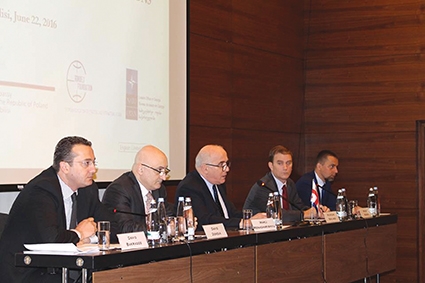Conference Held Prior to NATO Warsaw Summit: Challenges and Expectations
On Wednesday June 22 a conference entitled ‘NATO Warsaw Summit – Challenges and Expectations’ took place at the Radisson Blu Iveria Hotel in Tbilisi.
The event, organized by the Georgian Foundation for Strategic and International Studies (GFSIS) and Atlantic Council of Georgia, was dedicated to Georgia’s NATO track prior to the forthcoming NATO-Warsaw Summit on July 8-9. The conference sent a clear message that the Summit is a cornerstone in the process of defining the path for NATO’s future development: “Since the last Summit in the UK, major challenges have been posed to the Euro-Atlantic security system, both in conventional and hybrid dimensions.”
This week’s conference, supported by the embassies of Poland and Romania and the NATO Laison Office in Georgia, brought together representatives of the Georgian government, think tanks, embassies, international organizations and expert communities to discuss the Alliance Summit agenda.
The participants spoke of the significance of the Summit in terms of Black Sea regional security and NATO’s challenges and perspectives on its Eastern borders. In addition, the Alliance’s policy and its strategic approach to new threats and challenges, with a focus on Eastern Europe and Georgia, was broadly discussed.
As a keynote speaker, James Appathurai, NATO SecGen’s Special Representative for the Caucasus and Central Asia, addressed the audience from Brussels. The NATO official underscored some key elements that the Alliance is going to focus on throughout the Summit. Appathurai said that during its time in Warsaw, Georgia will be involved in more discussion formats than any other NATO member country. “There is no other non-member state that has so much NATO in it as Georgia does,” stated Appathurai, referring to the deepened cooperation between NATO-Georgia, and reiterating that Georgia has all the practical tools for membership.
Drawing parallels from Georgia of the present day and before, Deputy Foreign Minister David Dondua, speaking at the Conference, looked back to the NATO Prague Summit in 2002. “Some high-level diplomats attending the summit almost laughed at us when we first declared officially that Georgia should join the Alliance,” Dondua remembered. Furthering this concept, State Minister of EU and NATO Integration, David Bakradze, highlighted that Georgia, contrary to the past, has become a model country in the region in terms of progressive transformation and overall success achieved.
Georgia’s Defense Minister, Tina Khidasheli, who has appeared an ardent advocate of Georgia’s NATO membership during her time in office, shared her deeply-held passion with the audience that Georgia will become an Alliance member in the foreseeable future. “Expansion of NATO, and therefore expansion of freedom, is unavoidable.”
At the panel concerning NATO’s possible inclusion in Black Sea security matters, experts and official parties agreed that the Alliance should pay more attention to the Black Sea region. Turkish Ambassador to Georgia, Zeki Levent Gümrükçü stated that “for Turkey, Georgia being a NATO member means more security.”
It was widely recognized during the Conference that NATO faces dangers from the side of Russia, which continues to challenge post-Cold War peace in Europe, starting with the war in Georgia in 2008 and continuing with the aggression in Ukraine from March 2014. “Moscow’s ongoing occupation of Georgia, as well as the seizure and militarization of Crimea have complicated the security picture in the Black Sea region.”
Even though Georgia was promised eventual membership in the Western Alliance at the 2008 NATO Bucharest Summit, and the country has been enjoying its Substantive Package granted in Wales in 2014, the question as to whether the political step will be made by all 28 members still remains unanswered. In this context, Georgia is widely requested to retain her strategic patience and wait for the ‘right moment’ for her eventual membership.
Meanwhile, Georgia is getting ready for its 2016 parliamentary elections, which will play a significant role in the country’s future democratic life. Notably, in September, the North Atlantic Council (NAC) will visit Tbilisi, which undoubtedly sends a strong political message for the NATO aspirant country. At the same time, the opportunities Georgia is enjoying on her western path should be translated into real and unwavering actions from the government to finally realize the ability and willingness of the Georgian citizens and bring the country into NATO.
Zviad Adzinbaia












